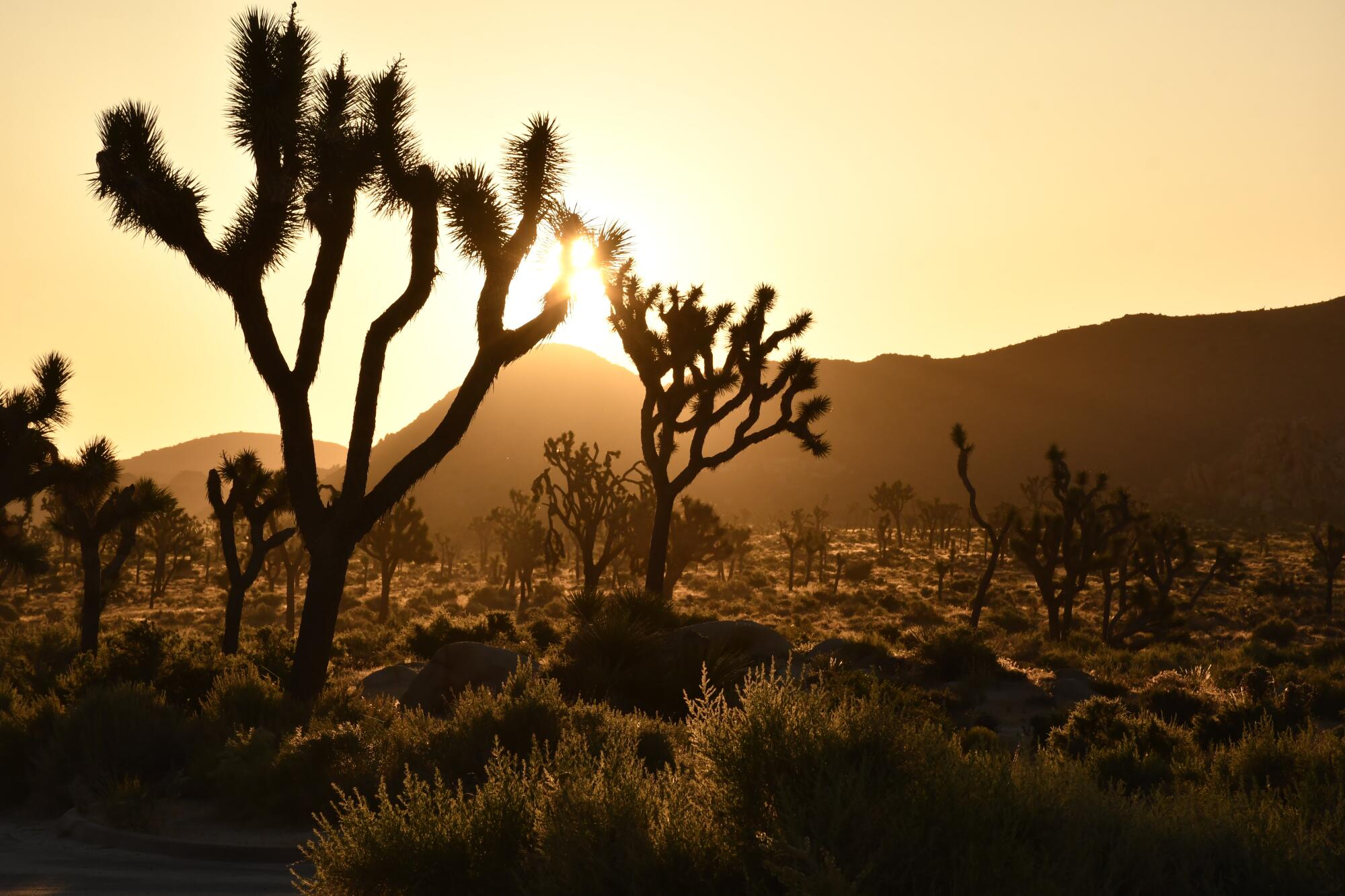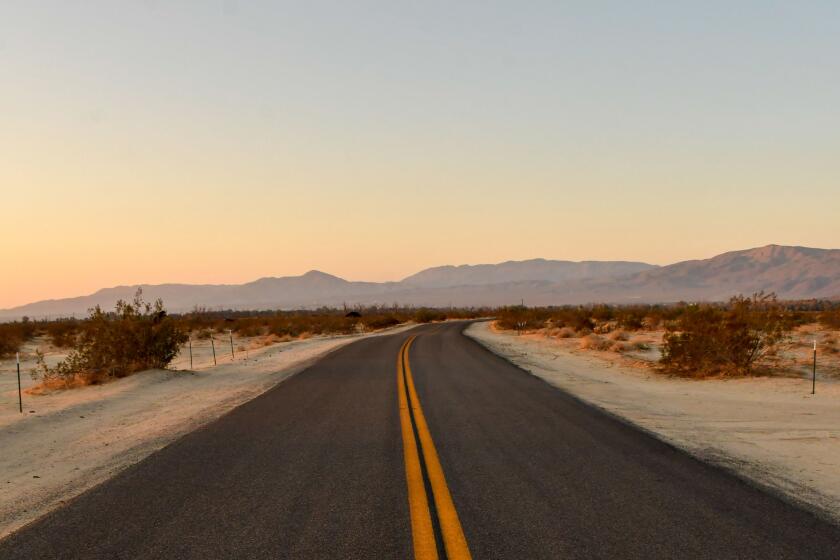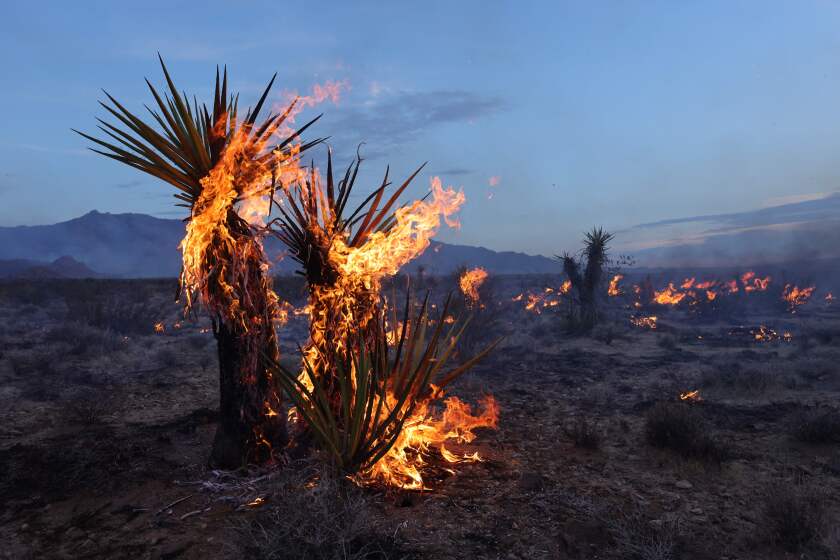
- Share via
I work as an editor and consultant, assisting people with their writing, including book projects. But last spring, it occurred to me that yet another year had passed, and I had not dedicated myself to my own writing. I decided I needed to move out of Los Angeles, or risk losing my connection to my creativity. I wanted to go to a place that was so unfamiliar that I could familiarize myself with who I might be without the influence of friends, family and whatever else obstructed me from writing.
I wanted to live in the desert near Joshua Tree because it’s a landscape that reduces the noise of daily life. Living outside the city would also reduce my expenses, and all I required was Wi-Fi since my work is done remotely. When I found a one-bedroom cabin on three acres of land, I signed a three-month lease. It’s been almost a year since I moved from L.A., and in the desert, I have found there is no place to hide from writing — or from myself.
In Landers, a rural desert community, my pink cabin with gray trim mirrors the sky at dusk. The great part about this place is that we’re all loners here, says the woman at the bar. I’ve heard her say this before, always talking to another customer. I didn’t come here to talk to people, and for the most part I don’t.
Trying to pinpoint the motives of shooters doesn’t protect us from future attacks the way common sense gun laws could.
At the cabin, the only entity I have locked eyes with is a coyote. One late afternoon a coyote sat in my front yard, looking toward the nearest property about 100 yards down the dirt road. Usually, around sunset, the woman who lives there throws food, I assume it’s meat, over her chain-link fence and a pack of coyotes gathers to feast. That late afternoon, the wind lifted the coyote’s thick red and gray and brown fur and I tapped the window. The coyote turned and looked at me, reflecting back an indifference rooted in wildness. Here, people, animals, plants, dirt, they don’t care if I brush my hair or call my mother or finish a novel, and that kind of aloneness is what I needed to write.
In Los Angeles, a stream of interruptions disrupted my writing. They came in the form of loved ones. I said yes to requests or demands for attention because I wanted to be a good friend, tía, sister and daughter. They came in other forms too. Throughout many years in Los Angeles, I’ve grasped whatever surface distractions glimmered. I’ve left my desk to go on dates and fixated on minor matters, such as work anxieties. After years of trying to write with sustained effort and only managing to write sporadically, I intuited there was something that existed below my consciousness, blocking me from writing.
Maybe it was a fear of creativity, fear of being devoured and transformed by the process. Maybe it was a consequence of trauma from my formative and adult years. Maybe it was both those things intertwined and swimming together in dark, psychic waters. Whatever lurked in that unconscious realm prevented me from writing seriously for a long time. Instead of turning toward it, I turned away.
Joshua trees are already struggling to reproduce in a warming climate. Replacing those lost in the York fire may be all but impossible, experts fear.
In Landers, only a few things interrupt my focus, such as coyote yips at night, the wind blowing at great speeds and artillery blasts from the Marine Corps base in Twentynine Palms. These kinds of interruptions find their way into my writing. I reflect on the desert’s symbolism and associations: The West, white supremacy, colonization, militarization, UFOs, vastness, heat, snakes, silence and more. The silence is why I keep extending the lease.
There is something magical about living alone in that silence. I’ve spent a weekday morning in bed and watched a flurry of snow that rendered the landscape stranger and surreal. I’ve seen snowfall only a handful of times and felt a childlike delight and deep sense of comfort from being inside the warm cabin. There is something frightening too. At the national park, I took a wrong turn and found myself lost, walking down a narrow, steep decline. The sun was lowering and there was a sharp chill in the air; there was no cell service and no other footprints. I stopped walking and realized that indifference meant that animals, plants and dirt didn’t care if I lived or died.
There is also something particular about how the desert slows down time. It is relentless. It can feel heavy and almost oppressive if you move against it. This kind of atmosphere has allowed me to be still enough for something to arise from the depths and patient enough to contemplate it. I’ve reflected on loss, death and abuse more than I care to admit. Instead of finishing a first draft of a novel, something more valuable is happening. I am cultivating a sense of patience and fearlessness when it comes to not just writing, but to life.
I want to bring that back with me to Los Angeles. I’ve decided to live in Landers for one more winter and return to the city in the spring. When I return, I’ll remind myself that it’s possible to remove distractions, especially the ones we’ve imposed on ourselves out of fear. When we do so, we can connect to a deeper part of ourselves and we can access our creativity in a powerful way.
These days, when I sit at my desk, I look at the dirt and creosote stretching before me, mile after mile, and the dirt looks like sand and the creosote looks like dried coral. When the sun sets, slants of light and shadow interrupt the stillness and sometimes the wind interrupts the stillness too. The wind bends the branches and pushes the clouds along, moment by moment. Day after day, I sit down at the writing desk and fill an empty page and remain open to what arises from the depths.
Zoë Ruiz is a writer and editor based in Los Angeles. @ruizzoe
More to Read
A cure for the common opinion
Get thought-provoking perspectives with our weekly newsletter.
You may occasionally receive promotional content from the Los Angeles Times.












